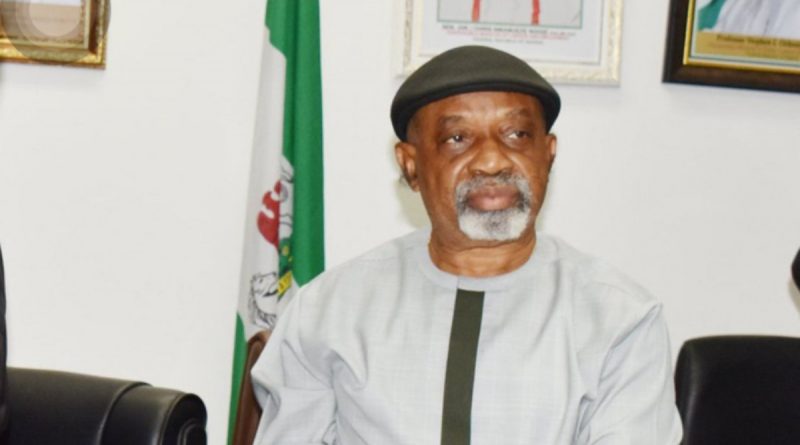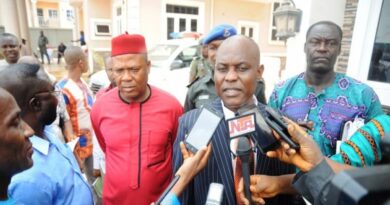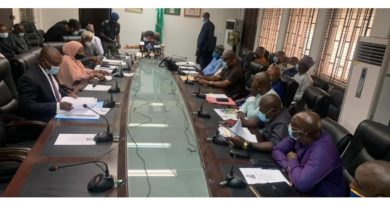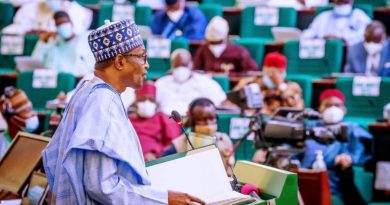Ngige and the resolution of FG/ASUU dispute
By Emmanuel Nzomiwu
At last, there is hope of resumption of academic activities in Nigerian public universities. Last Friday, November 20, 2020, the Federal Government made new offers to the striking Academic Staff Union of Universities (ASUU) after a meeting that lasted seven hours in the office of the Minister of Labour and Employment, Senator Chris Ngige. Ngige told journalists after the meeting that they held very fruitful discussions and made substantial progress at the meeting.
“We discussed dispassionately and I can report back to you that we touched all the issues. Government has shifted their position as demanded by ASUU on issues of revitalization of public universities, Earned Academic Allowances (EAA) and the payment of the withheld salaries of lecturers and on the issue of mode of payment for the transition period, while the University Transparency Accountability Solutions (UTAS) platform is being tested by the National Information Technology Development Agency (NITDA),” Ngige said.
President of ASUU, Professor Biodun Ogunyemi, corroborated the statement made by Ngige. Ogunyemi said the Federal Government has given the union some new offers, which they would present faithfully to their members through their organs and report back to the government. He described the new offers as a slight modification of what they got earlier, but acknowledged that progress has been made.
ALSO READ: FG vs ASUU: Hope rises on suspension of strike soon
Before I go into the thesis of this write-up, permit me to reproduce some of the new offers made at the meeting here for the benefit of our readers who may not have been abreast of the latest developments in the dispute between the Federal Government and ASUU.
Regarding the issue of funding for the revitalization of public universities and EAA, the government moved from their initial N20 billion for revitalization fund and N30 billion for EAA and brought on the table extra N15 billion. By that, the proposal in one basket is N25 billion for revitalization and N40 billion for earned allowances for all the unions in the university system.
The government made a second basket offer of N30 billion for revitalization and N35 billion for EAA. ASUU is supposed to come back to the government with the acceptance of one of either of the offers while vice-chancellors are to submit details of the EAA to the National Universities Commission (NUC) on or before 30th November, 2020.
On the issue of visitation panel, the government issued a directive to the Honourable Minister of Education to publicize details of the visitation panels, including terms of reference and the composition of the panels before the end of November 2020. ASUU confirmed that they were satisfied with the progress made on the reconstitution of the 2009 FGN/ASUU re-renegotiation committee, after the letters of appointment of the members were tendered before them.
With respect to the issue of withheld salaries, the meeting agreed that the Federal Ministry of Education and the Federal Ministry of Labour and Employment will look into the issue of “No work, No pay” as stipulated in Section 43 of the Trade Dispute Act Cap T8 Laws of the Federation of Nigeria (LFN), 2004, with a view to getting approval for payment of the withheld salaries.
It was also agreed that the mode of payment applied for the payment of those that had not been captured on IPPIS platform between the months of February and June 2020 be adopted for the purpose of payment during this transition period. Sen. Ngige later clarified that the government decision to exempt ASUU is a temporary measure pending the conclusion of integrity test on UTAS.
In addition, the meeting agreed that a suitable template that will address all the anomalies identified in the previous process should be handled by the AGF, executive secretary of National Universities Commission (NUC) and the accounting officers (vice-chancellors).
On the demand by ASUU for the payment of its check-off dues, the union of academics and other unions were directed to provide the office of the AGF with necessary information and dedicated account details in writing to facilitate the deductions and remittance of check-off dues, as requested.
The outcome of the meeting has rekindled hope of the re-opening of all Nigerian public universities that have been shut down for the past eight months. Recall that the union had declared a warning strike on March 9, 2020, with a two-week ultimatum to the Federal Government to meet their demands. When government could not meet the demands of ASUU within the given time-frame, the union declared an indefinite strike on March 23, 2020.
The industrial action coincided with the closure of all universities by the NUC as part of the lockdown measures to contain the COVID-19 pandemic. The demand by ASUU to be exempted from the Integrated Payroll and Personnel Information System (IPPIS) appeared to be the knotty issue in the dispute.
Other unions in the university system, including the Senior Staff Association of Nigerian Universities (SSANU) and Non-Academic Staff Union of Universities (NASU), have since enrolled into the IPPIS, the accountability software of the Federal Government made compulsory for all public institutions, mainly for personnel payroll.
ASUU refused to key into the platform on the grounds that it would affect the autonomy of universities. The union also insisted that IPPIS did not consider some of the peculiar operations of universities.
Before the strike and COVID-19 lockdown, the government side met with ASUU twice to resolve all the issues in dispute, bordering on the agreements that both parties entered in the past. Ngige invited ASUU for a meeting during the lockdown but the union insisted on meeting face-to-face with the government side. Both parties resumed talks on October 15, 2020, after the Federal Government lifted the COVID-19 lockdown.
Successive meetings held on October 21 and November 4 ended in deadlock. The deadlock appears to have been broken at the last meeting on November 20. Following the concessions made by the government side, the ball is now in the court of the ASUU, which promised to consult its members and report back to government.
We have gone this whole hog to show the tortuous path taken by the Federal Government and ASUU to reach the point they are now. Credit should go to Senator Ngige and other members of the government side who took all the bullets from ASUU and their sympathisers in the media. There is no disputing the fact that the Minister of Labour has exhibited brinkmanship even though he is not the direct employer of the university lecturers.
The media attacks, targeted at Senator Ngige, some coming from the local branches of ASUU, did not deter him from pursuing the resolution of the university teachers strike like he did in the case of the National Association of Resident Doctors (NARD) and the Joint Health Sector Unions (JOHESU).
As the Chief Labour Officer of the country, he sat for several hours in meetings conciliating, in a bid to see that the ivory towers re-open again. Curiously, he was even accused of mediating in the ASUU strike because his children are studying in Nigerian universities.
While receiving members of a break-away group from ASUU, under the auspices of Congress of Nigerian University Academics (CONUA), Sen. Ngige explained why he sent his three children to Nigerian universities. “Two of my children are citizens of United States of America. I had the opportunity of sending them to school in the area I live in United States because public universities are affordable there. But I brought them to Nigerian universities to make them homegrown. I want them to speak Nigerian languages.
“I want them to scramble for seats in the lecture rooms with the children of Okada riders, civil servants, traders, cleaners and others who struggle to send their children to university with meagre earnings. They have made friends across all classes of people. Their friends come to my house and I am happy about it,” he said.
The minister re-affirmed government commitment to the revitalization of public universities. According to him, a large chunk of money from the Tertiary Education Trust Fund (TETFUND) goes into the university system, polytechnics, and colleges of education. He noted that the country was in dire times economically as a country and everybody should know that even the agreements being pummeled on the faces of the government were not entered into by the current administration.
“We were not here in 2009. When they negotiated 2013, we were not here. But, even at that, we said government is a continuum. We will pay in a staggered form. But the prices of oil fell to below 50 dollars a barrel, 40 dollars a barrel and 30 dollars a barrel.”
“And even this COVID, it was 15 dollars a barrel. And we had nobody buying our oil for about one month. We had to pay for storage. They said this government is an elephant. You can cut any size and eat. We are no longer elephant. Nigeria is now small in size economically. You are all academics. Check the budget at that time at the exchange rate to the naira. Check it today in our budget and divide it by today’s exchange rate. It has shrunk by nearly 50 percent.”
Finally, I will not conclude this piece without lending my voice to the call by Sen. Ngige for all of us to put on our thinking caps and decide how we are going to fund education in the country. I am throwing this challenge to all stakeholders, including the government and the ASUU. A nation cannot develop beyond the quality of its ivory towers.
•Nzomiwu, a journalist wrote from Abuja.
For Advert Placement, Sponsorship, support, Article submission, suggestion, etc, Contact us: info@theabusites.com, +2349015751816 (WhatsApp)








